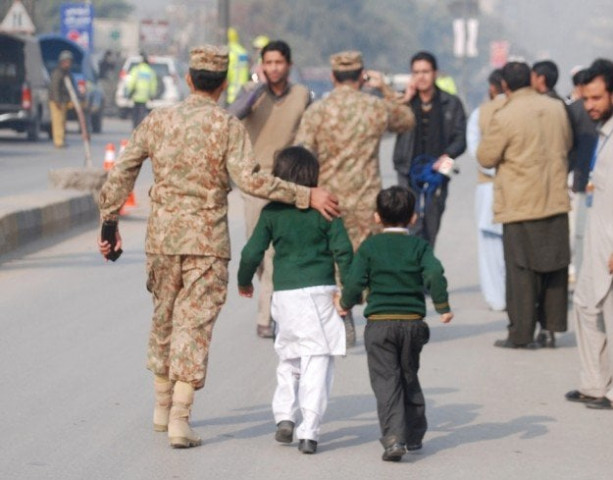Afghan legislators see ‘positive change’ in Pakistan’s approach
Believe the APS attack brought about a transformation in the leadership’s policies

Believe APS attack brought about transformation in the leadership’s policies. PHOTO: AFP
Afghan lawmakers say they have observed a ‘visible change’ in Pakistan’s approach towards Afghanistan as leaders of both countries have shown a strong desire to work for peace in Afghanistan. The Afghan parliamentarians believe the December school attack led to this renewed relationship.
Transformation
Speaking to The Express Tribune after their meetings with Prime Minister Nawaz Sharif and his National Security Adviser Sartaj Aziz, Afghan MPs stated in the past they had “suspicions” about Pakistan but are now “completely satisfied” with its assurances to help promote peace in Afghanistan.
“I noticed a huge difference in the ideas of Pakistani leaders as they underscored the need for peace in Afghanistan. Feeling the pain of the Peshawar school attack has helped Pakistani leaders understand the pain Afghans have experienced over the past 35 years,” said Afghan senator Ranra Tareen.
Tareen is the member of the delegation that met PM Sharif on the sidelines of a security dialogue with their Pakistani counterparts in Islamabad this week. “We had demands and complaints, and criticised Pakistani policies, but the leaders have assured us they stand firmly with Afghanistan now,” she said.
Abdul Qadeer Zazai, the chairman of International Affairs Commission of the Afghan National Assembly, said he found Pakistani leaders “very cooperative”.
“I always had suspicions about Pakistan and would doubt its commitments with Afghanistan, but have realised now that there is a change in the thinking of Pakistani leaders,” said Zazai, who was also part of the security meetings.
“The Pakistani prime minister, security adviser and all officials we met told us that they do not want more war in Afghanistan. We believe they sincerely want to help us,” Zazai told The Express Tribune.
Moreover, Afghan ambassador in Islamabad Janan Mosazai said the Afghan government has decided it would not allow any country, group or individuals to use Afghan soil against Pakistan and any other neighbouring country. “We also expect our neighbours to do the same,” Mosazai said.
Enhanced cooperation
Interaction between the two countries has increased in the past few days; Afghan President Ashraf Ghani has also invited Pakistani political leaders as well as four Pukhtun leaders to Kabul next week for talks. Jamiat Ulema-e-Islam-Fazl (JUI-F) spokesperson Jan Muhammad Achakzai told The Express Tribune on Friday that JUI-F chief Maulana Fazlur Rehman has also been invited. However, Achakzai said, it has not been decided yet who will attend the talks from his party.

The massacre of schoolchildren in Peshawar, a series of attacks in Kabul and the Afghan Taliban offensive in Kunar province have encouraged Pakistan and Afghanistan to boost cooperation in security areas and to put in place effective border management. These measures include the revival of two border coordination centres at Torkham and Spinboldak, a border town in Kandahar province.
Both countries have always complained of loose border control which enables militants to cross to the other side whenever one country launches an offensive on its side. However, the situation seems to have changed now and the military chiefs of the two countries have agreed to implement a mechanism for effective coordination at the time of military operations.
Since the new Afghan leadership took charge in September, top military leaders and intelligence officials have also enhanced cooperation. Afghan Army Chief General Sher Mohammad Karimi’s recent visit to Pakistan was considered significant for coordinating border area security operations as Afghan forces have now formally assumed security responsibilities and would need Pakistan’s cooperation to secure the 2,500 kilometres porous border.
It has been learnt that TTP militants, who had been operating from some areas near the Afghan-Pakistan border, have been uprooted as the result of operations by Afghan forces and US drone strikes.
Pakistan’s army chief General Raheel Sharif had personally praised the Afghan forces for the offensive in a meeting with his Afghan counterpart in Rawalpindi last month.
Published in The Express Tribune, January 3rd, 2015.



















COMMENTS
Comments are moderated and generally will be posted if they are on-topic and not abusive.
For more information, please see our Comments FAQ